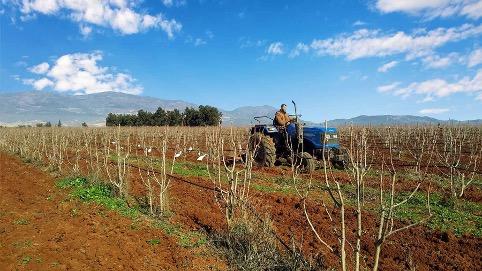WEF-CAP capitalizes WATERMED 4.0, a solution for and efficient water management in semi-arid areas of the Mediterranean

The WATERMED 4.0 project (Efficient Use and Management of Conventional and Non-Conventional Water Resources through Smart Technologies Applied to Improve the Quality and Safety of Mediterranean Agriculture in Semi-Arid Areas), funded under the PRIMA programme, aims to develop and apply an integrated decision support system (DSS) based on the Internet of Things (IoT) for managing the entire water cycle in agriculture, including monitoring water resources (both conventional and non-conventional) and water demands. The project also aims to measure the economic, energy, social, and governance factors that influence water use efficiency in Mediterranean agricultural production areas.

The specific objectives of the WATERMED 4.0 project include:
- Objective 1: Studying, adapting, and implementing technologies for reclaimed water and re-use in Mediterranean agricultural areas to increase water quantity and quality.
- Objective 2: Developing sensor and communication protocols for monitoring and controlling water distribution systems at wastewater treatment plants to improve efficiency, reduce operational and energy costs, and minimize water losses.
- Objective 3: Improving agricultural productivity in Mediterranean agrosystems by optimizing fertigation management and minimizing water and fertilizer use.
- Objective 4: Analyzing the potential of agrophotovoltaic applications (APV) to reduce irrigation needs through shadowing and using PV-based water treatment for low-quality water to prevent or mitigate soil salinization.
- Objective 5: Conducting socio-economic studies and improving water governance in Mediterranean partner countries to determine the long-term effects of water management on local populations, growth, job creation, professional specialization, and income generation.

The overall approach of the project is to increase the efficiency in managing both conventional and non-conventional water resources in agriculture from an integral perspective. This involves leveraging digitalization, cyber-computing, and an open platform to enhance technology development, societal engagement, governance, and knowledge transfer.
The WATERMED 4.0 project involves a multidisciplinary team of eight partners from five countries:
- University of Murcia (Spain – Coordinator);
- Central Board of Users of Vinalopó Basin, L'Alacantí and Water Consortium of Low Marina (Spain);
- Spanish National Research Agency CEBAS CSIC (Spain);
- University of Oran1, Ahmed Ben Bella. LAPECI laboratory (Algeria);
- University of Djilali Bounaama Khemis Miliana. Research laboratory of agricultural production and sustainable development of natural resources (Algeria);
- Fraunhofer Institute for Solar Energy Systems ISE (Germany);
- Arvum S.r.l (Morocco/Spain);
- Turkish Water Institute SUEN (Turkey).

The expected impacts of the WATERMED 4.0 project include real-time monitoring and control of the water cycle for agriculture, facilitated by the IoT and services. This will help increase the quantity and quality of water available for agriculture while saving water and nutrients. The project also aims to contribute to increasing the quantity, quality, and safety of non-conventional water use in agriculture and food processing, as well as improving the efficiency of water management systems in terms of energy and smart infrastructures.
As a relevant experience and example of good practice, WATERMED 4.0 is expected to be highlighted by WEF – CAP in upcoming discussions and workshops related to good policy development.
More information about the project can be found here.
WATERMED 4.0 developed several videos that are available here.









